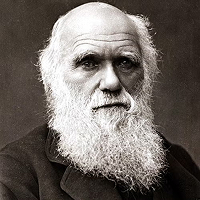Quotes By Charles Darwin

Naturalist And Geologist
Charles Darwin
Feb 12, 1809 - Apr 19, 1882
We will now discuss in a little more detail the Struggle for Existence.
Wherever the European had trod, death seemed to pursue the aboriginal.
We cannot fathom the marvelous complexity of an organic being; but on the hypothesis here advanced this complexity is much increased. Each living creature must be looked at as a microcosm--a little universe, formed of a host of self-propagating organisms, inconceivably minute and as numerous as the stars in heaven.
The question of whether there exists a Creator and Ruler of the Universe has been answered in the affirmative by some of the highest intellects that have ever existed.
Origin of man now proved. Metaphysics must flourish. He who understands baboon would do more towards metaphysics than Locke.
In conclusion, it appears that nothing can be more improving to a young naturalist, than a journey in distant countries.
I feel most deeply that the whole subject is too profound for the human intellect. A dog might as well speculate on the mind of Newton. Let each man hope & believe what he can.
But Natural Selection, as we shall hereafter see, is a power incessantly ready for action, and is immeasurably superior to man's feeble efforts, as the works of Nature are to those of Art.
I think it inevitably follows, that as new species in the course of time are formed through natural selection, others will become rarer and rarer, and finally extinct. The forms which stand in closest competition with those undergoing modification and improvement will naturally suffer most.
Natural Selection almost inevitably causes much Extinction of the less improved forms of life and induces what I have called Divergence of Character.
A fair result can be obtained only by fully stating and balancing the facts and arguments on both sides of each question.
I have always maintained that, excepting fools, men did not differ much in intellect, only in zeal and hard work; and I still think there is an eminently important difference.
I am dying by inches, from not having any body to talk to about insects.
Only picture to yourself a nice soft wife on a sofa with good fire, & books & music.
But a plant on the edge of a deserts is said to struggle for life against the drought, though more properly it should be said to be dependent upon the moisture.
Man with all his noble qualities, with sympathy which feels for the most debased, with benevolence which extends not only to other men but to the humblest living creature, with his god-like intellect which has penetrated into the movements and constitution of the solar system-with all these exalted powers-Man still bears in his bodily frame the indelible stamp of his lowly origin.
One day, on tearing off some old bark, I saw two rare beetles, and seized one in each hand. Then I saw a third and new kind, which I could not bear to lose, so I popped the one which I held in my right hand into my mouth. Alas! it ejected some intensely acrid fluid, which burnt my tongue so that I was forced to spit the beetle out, which was lost, as was the third one.
The expression often used by Mr. Herbert Spencer of the Survival of the Fittest is more accurate, and is sometimes equally convenient.
Our descent, then, is the origin of our evil passions!! The devil under form of Baboon is our grandfather.
It is difficult to believe in the dreadful but quiet war lurking just below the serene facade of nature.
Popular Authors










